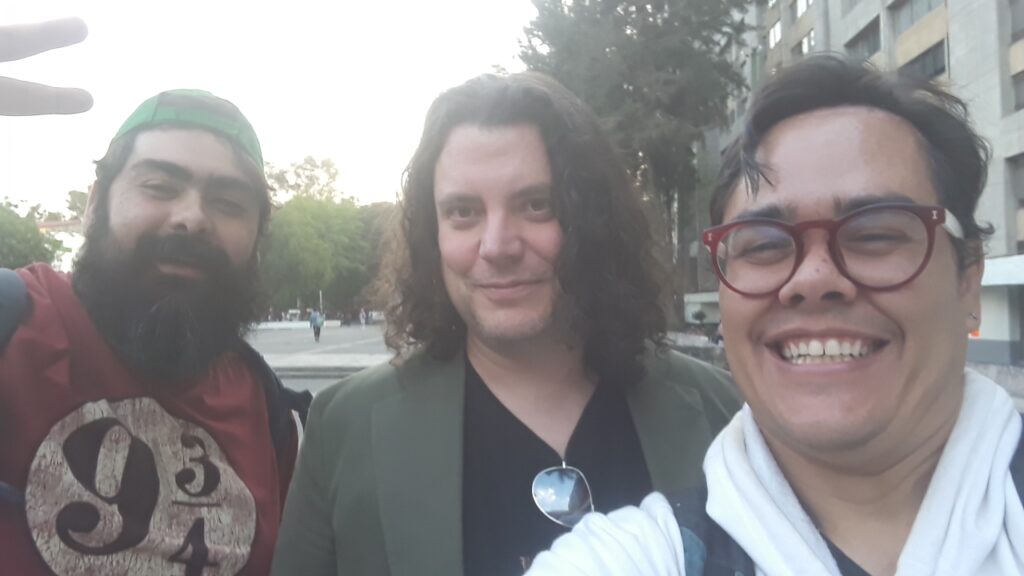
Note: I took all of the photos in this post except the above, taken by Ricardo, and one below, noted as taken by Ricardo. I took the video of Iván playing electric bass; he took the video of me doing the same.
Update #1: The inaugural issue of Letras Con Locuras has been published. Our meeting is described (in Spanish) on pages 68-71 with photos; the rest of the magazine is very exciting and vibrant as well!
Update #2: Regarding abuses in Mexican psychiatric/medical institutions, see also this Disability Rights International report, Abandoned & Disappeared, and their related video, both from 2010.
Last Sunday, at the Sea-Tac International Airport, I boarded an Aeroméxico flight headed for Mexico City (CDMX). That followed a sleep-deprived, caffeine-chugging week of intensely working on relinquishing my Seattle apartment: downsizing, donating, discarding, digitizing, and depositing (for long-term storage at a friend’s) seemingly all of my worldly possessions. I never would have accomplished that huge task without the exceptional help of my amazing Seattle area friends. No way. I can’t thank them enough.
And then, there I was: after nine years of living in Seattle and telling people I’d leave the country long term someday, I was finally stepping into the aircraft, listening to Spanish Christmas carols jingle out of the overhead speakers. The plane held maybe 200 passengers. Save for count-on-one-hand number of Japanese folks reading kanji, and count-on-the-other-hand number of white, presumably U.S. people, the whole rest of the metal tube readying to jet through the sky was filled with what I took to be Latin Americans. The flight attendants spoke in Spanish, the announcements were in Spanish—I was headed, as my mom would say, a long way from Gilmer, Texas. Maybe not as the crow flies, but certainly as the imaginary lines found on maps decree.
Just before the flight taxied toward the runway, the attendants tried mightily to close an overhead compartment, the door of which was stubbornly refusing to close without somebody’s strap from their backpack hanging out (not mine, I promise). So they just left it dangling out and closed the compartment that way. It was a subtle little telling detail of the sort fiction-writers prize that concisely gave a sense of how Mexico would be way the hell more laid back than the United States, where such a rogue strap might cause a U.S.-based airline’s flight attendant to bark at a passenger that the item must now be checked at their own great expense. (Decades ago, Southwest Airlines was probably this chill in the States, but no longer.)
When I wasn’t dozing on the flight—my caffeine withdrawal timer starting—I was reading Marty Friedman’s newly released memoir Dreaming Japanese. The astonishingly versatile, poodle-haired electric guitarist, known in the U.S. for playing with Megadeth, gave up his gig with the world-famous metal band at the end of 1999 and moved to Japan, where he rebuilt his career from the ground up, reaching the same or greater heights playing different types of music he was also interested in. It seemed an apropros read for my long-term travel since I’m getting a little sick of writing what sometimes feels like the same journalism articles (even though they’re not), for an audience that seems too precious to lift a finger about injustices but not too precious to then act confused on social media as to why things are getting worse (even though the audience is more effortful than my bad moods make them out to be). I’m hoping Mexico’s calmer pace will help me pour more prioritized time into writing science fiction.
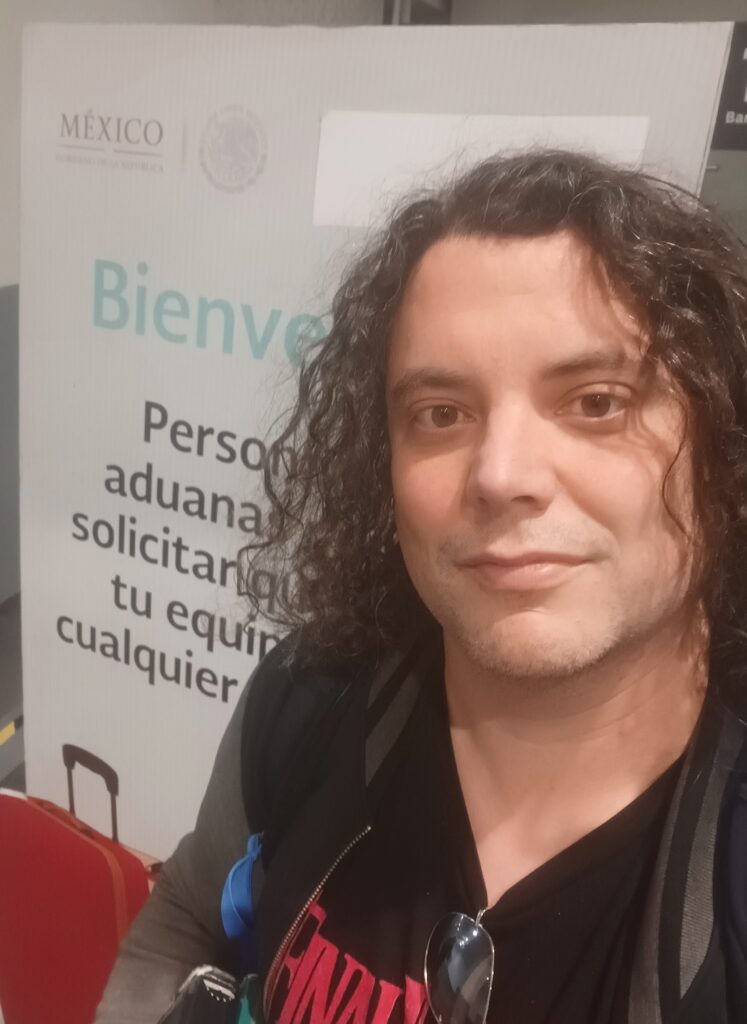
We landed. I descended the plane stairs, my weighty blue backpack straining my traps, then took a shuttle to immigration. La migra is a concern even for some well-to-do USians because you might get a jock officer who wants to throw his weight around and make your cross-border life difficult. Luck of the draw had me standing in front of a little circular desk, at the center of which sat a very Mexican woman with a full complement of rock’n’roll-looking tattoos on both arms. She seemed bemused by this pale man, at merely 5’10” still taller than most Mexican guys, in front of her, with his hair certainly longer—nearly every Mexican dude has short hair (so as not to distract from needlessly carrying that heavy machismo burden). She asked if I spoke Spanish. “Un poco” (a little), I said, hedging my bets. She let out a stream of rapid Spanish, but I caught enough to understand she wanted to know my job, a standard border question. I’d planned to say Maestro (teacher), but I blurted out Escritor autónomo (freelance writer). Both are true, but in the U.S. anyway, the former sounds less sketch. She sort of looked at me like Really? Really? Because if you wanna prove it, my shift ends at— But more important than any of that (half in my head, I’m sure), she gave me the full six months on my visa, which on rare occasion, ornery guards do not dispense.
After immigration, before getting my suitcase, I took the above selfie, because 2024. Visited the money-changers in their garish little temples right outside the airport, then taxied to my hostel, got set up, and decided to find dinner before collapsing into a deep, caffeine-withdrawal sleep.
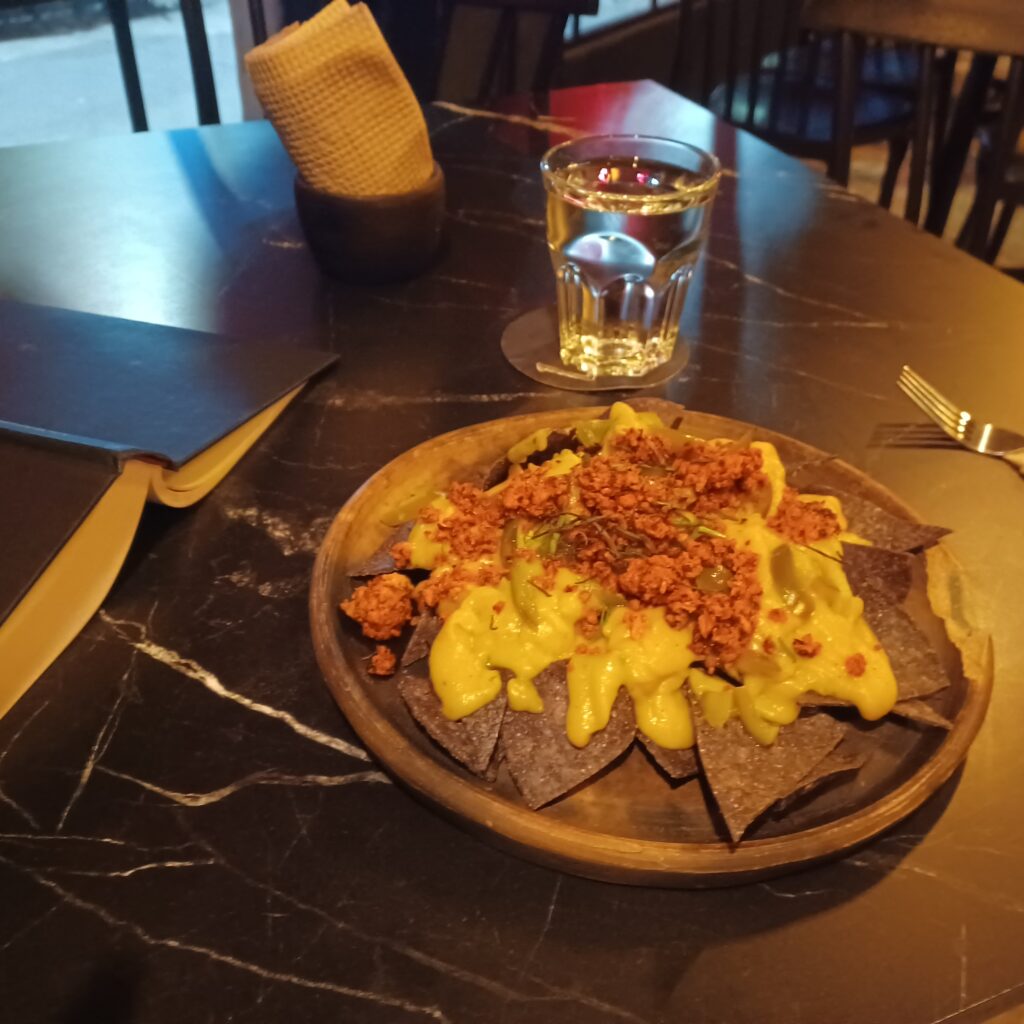
As luck would have it, I found Luvina, a vegan bar with U.S. and local(?) heavy metal driving sound waves from the overhead speakers into my skull—quite like Seattle’s Georgetown Liquor Company not far from m̶y̶ ̶h̶o̶m̶e̶ my former home. Once a few communication difficulties were surmounted—the polite waitress unnecessarily apologized for not speaking English—I ordered a plate of nachos with queso and soy chorizo atop. Including tip, that cost me a grand total of $5 USD. At the excellent Georgetown in southern Seattle, the equivalent would probably run you $30 USD. And people are asking why I went to Mexico?
Yeah, WTF am I doing this?
Well, I purchased my airfare prior to the 2024 U.S. presidential election going to Trump, so it wasn’t that, although Teflon Don shouting about bringing back institutionalization (lock up those with severe mental health issues, or perhaps a history of them, whether they like it or not, potentially forever) and about (illegally) staying in office past another four years did accelerate me somewhat. So did just about every non-MAGA USian’s lack of response. In 2016, his victory caused a flurry of panicked messages on U.S.-based email lists I’m on—even civic freeloaders (non-activists) were freaking out and exchanging contact info and also buying toilet paper, wait, no, that was the pandemic. Worriedly exchanging contact information might not be Zapatista-level resistance, exactly, but the complete absence of even that bare minimum in 2024 was unsettling, as if everyone had silently agreed to just doormat for MAGA (“focus on other things”), give ’em the green light to stamp the gas pedal all the way down, which they will. Activists might argue that in 2016 they marched down streets yelling, and civic freeloaders might argue that in ’16 they give $50 to this or that milquetoast nonprofit, so why bother doing the same in 2024 when it didn’t work in 2016? But there are other, better options: see how Romania, Georgia, and other countries are currently responding to reactionary takeover attempts in their lands. Even when they’re “tired” or their “head hurts” or they’d “rather watch comedians,” they’re risking their friendships, their jobs, their freedom (facing arrest or murder). Civic freeloaders, sometimes even activists, in the U.S. refuse to admit that they too can take such actions and regain dignity, selfhood, esteem. Therefore showing people counterexamples and options from beyond their familiar borders should be normalized. Like, say, this blog post.
Again, though, politics didn’t motivate my move, if by politics you mean group affiliation (yoking oneself to teams). If you mean perspective or attitude, then sure, I’m seeking adventure. I grew a lot as a person by moving from Texas to the Pacific Northwest in 2015, so a decade later, it’s time to journey similarly, connecting with new sources of joy and knowledge, while pruning away some of the old, withered, under-performing ones. I’m not into the self-immurement thing where people literally build giant walls around their property and spend decades inside, waiting for death via their death-pledges (ever looked up the literal meaning of the word mortgage?). That said, I’ll probably be eating this paragraph—to a degree—at some point, because an increasingly not-young life lived out of a suitcase is likely not for me, either. No need to figure it out right now. Thanks to Border Tattooette, I have six months to work on eight goals, the areas of which are:
- Fiction-writing
- Money
- Physical health/exercise
- Organizing my life in various ways
- Journactivism (it never stops)
- Reading
- Spanish
- Mental health
Take me down to the Mexico City where…
At first CDMX—specifically, the Centro area—reminded me a bit of Queens or the Bronx, a world-city with a thousand smells, a million people on the sidewalks, and a zillion street vendors selling wares of enigmatic provenance—and then somebody zooming around automobiles on a motorcycle, triumphantly waving a boombox blasting AC/DC, or numerous other surprises. Except last time I was in New York City (to give a talk on election security at the Hackers on Planet Earth conference), just this summer, there was less of all that than movies make you think. The Centro of Mexico City, by contrast, really does have this U.S.-stereotypical “NYC stuff” everywhere.
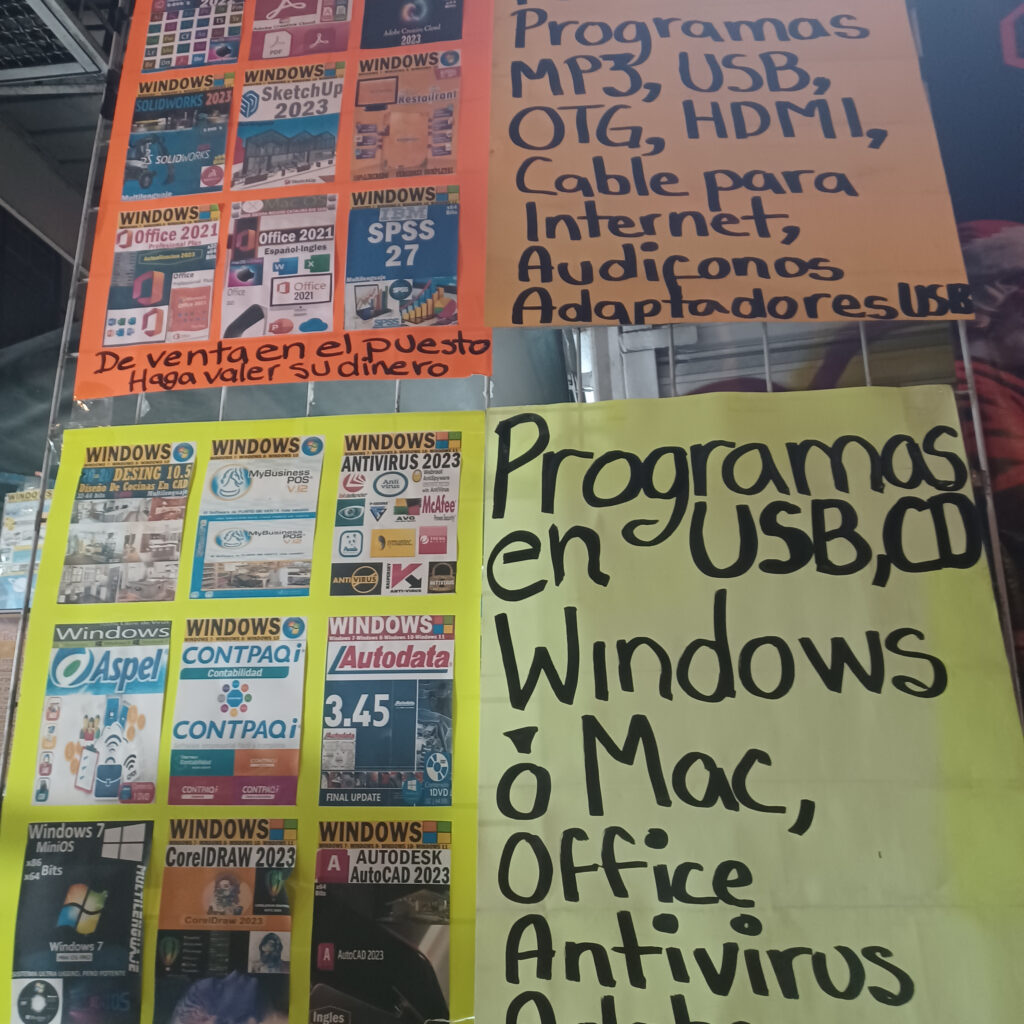
Exploring the streets at one point, I passed a vendor whose stall caught my eye. Astronomy binoculars, astronomy laser pointers, and a bunch of radio gadgets like Baofeng VHF/UHF transmitters! Now why would astronomy gear accompany radio gear? I half-expected to see a Jules Verne-esque diving helmet or maybe Geordi La Forge’s visor. Another stall was just one of many offering software. Like some cyberpunk novel, or that Super Nintendo game Shadowrun. Yeah, let me purchase one of these chips for some nuyen, I mean pesos, and stick it into my brain to double my reflex speed, evade those Intrusion Countermeasures Electronics. You get the feeling you can find anything here if you look long enough, and indeed, seems people come from all over the place to shop in the Centro.
Most days this past week, the weather’s been ideal, easily 70 Fahrenheit in the middle of December, with the sun brighter than Texas. Sunglasses helped. As the week continued, I listened to organ grinders play their flat-sounding antique instruments and wondered if their controversial sound would grow on me. I bought La Jornada each morning—the New York Times equivalent in Mexico that printed leaked U.S. diplomatic cables a decade and a half ago—for 10 pesos (50 cents) daily and practiced reading at least the headlines. Primarily I focused on practical things, though, such as buying bandaids for a cut on my heel or finding a large hair brush since my bulging suitcase wouldn’t quite fit one. Whenever, wherever you are, you still have to go through each day accomplishing tasks, the incessant becoming Zen Buddhists talk (complain?) about. But every once in a while, you look around and think, Holy shit, I’m in another country!
Lots of little awkward moments to decipher, too. Things you ordinarily don’t think about growing up in just one country for decades. Do I pay before or after eating at a streetside restaurant? (Depends, but usually after.) How do I ensure the ATM gives me the right amount of MXN? (The screens of ones I used made everything clear, albeit in Spanish.) How the heck will I squeeze into this packed subway train? (By accepting that we’re all friends here, close friends.) A lady gave me the kiss-cheeks greeting I assumed was a European thing, how on Earth do I respond? (Just bumping cheeks seemed to suffice.)
Even if I weren’t deep into caffeine withdrawal, all the new learning would still have been enough to send me, each night, into deep slumber.
Mexican mental health activists and Letras con Locura
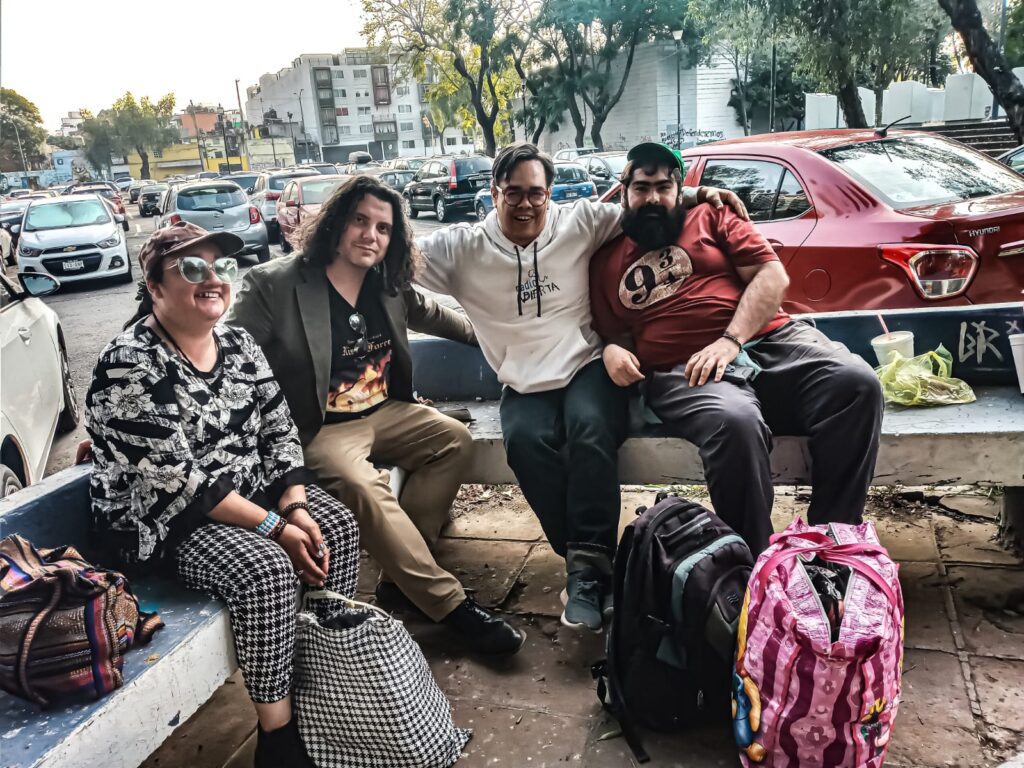
When I went to British Columbia, Canada alone in 2019, I thought it important to connect with local activists there involved in movements I participate in. That included Food Not Bombs and whatever radical mental health activists I could find. Doing the same thing in Mexico City made sense. Another benefit of meeting with CDMX mental health activists is that I could ask them questions about how the Mexican psychiatric system functions and malfunctions, something I needed to know for myself.
It’s approaching three years since I last discharged from a psychiatric hospital (for severe manic depression), a recovery I largely began thanks to a variant of EMDR called brainspotting. I still take lithium and quetiapine, but am slowly—very slowly—tapering down on each, with the assistance of simpatico clinicians in the States. But none were able to tell me if a rural Mexican pharmacy would have exactly “lithium carbonate (extended release)” or what. So I thought I’d ask the pros, the real experts when it comes to mental health: the survivors, others like me who’ve figured their shit out enough to help others in the same peculiar, stigmatized boat. While having a touch of depression can be trendy—see mentally ill gf memes—nobody of the so-called sane is exactly beating down doors with answers or invitations for those experiencing extreme distress, delusions/strange beliefs, or unshared perceptions (pejoratively, hallucinations; praised, revelations). If this is you, then, like people punched in the face and laughed at anywhere, eventually you have to show up for yourself and each other, or die. Resistance is existence.
Thanks to Luis Gerardo Arroyo Lynn, a journalist with Mad in Mexico, an affiliate of journalist Robert Whitaker’s Mad in America, I was put in touch with Iván Maceda Mejías, an activist here in CDMX. Later, on Thursday, I had dinner with Luis—at the same vegan bar, Luvina—where he patiently answered my questions and pointed me to a report, by Documenta in 2020, regarding human rights abuses in the Mexican mental health care system. It was great to discuss the subject with Luis, including similarities and differences between the United States and Mexico.
On Tuesday, Iván met me at my hostel. We’d planned to meet three other activists he knew a bit later for lunch, but right now we had some time to roam the streets, ostensibly looking for a cafe, talking and getting to know one another. Music is huge everywhere—my music-related belongings I listed on Craigslist and FB Marketplace for leaving my apartment drew more attention than any of my other items—but music in Mexico is ginormous: the Centro has infinite music shops selling electric guitars, basses, drum kits, horns, PA systems, the works. I told Iván about a nice cherry sunburst 5-string Jackson bass I’d seen near my hostel, and we discovered that we both play(ed) electric bass. He’s played in 20+ bands, far more than I ever have; I switched from music to writing in 2006. Nevertheless, I can still play a little today, so out the window went the serious topics of journalism, mental health activism, and the rest as we rushed to find a music shop where we could take turns playing bass.
After jamming out, Iván and I rode the subway to meet another activist friend of his, Santiago Cervera Gutiérrez, then proceeded to ride a second subway train to the Tlatelolco area, still considered part of the Centro. The subway cars were densely packed and they even had a separate train for women (with or without children) to take optionally—women could still ride the non-exclusive train if they wanted. Thought-provoking for sure, but probably it’d be better to actually punish male offenders and sink masculinism fully.
We got some food and my caffeine withdrawal (and intense introversion) must have been showing, because I got a few questions as to my quiet. It was all good and reminded me a little of peer support communities in Seattle where people openly check on each other, usually just a little, when necessary, asking somebody how they’re doing, instead of always saying everything behind people’s backs. Then Iván, Santiago, and I met up with Thania Fernández Arceo and Ricardo Sánchez, both of whom work with Colective Chuhcan, an organization of diagnosees demanding an end to systemic abuses in the psychiatric system.
Iván, Santiago, Thania, and Ricardo had been key to Radio Abierta (Open Radio), the first radio program in Mexico featuring, and run by, personas con algún padecimiento psíquico (people with some mental illness). The weekly show began in 2009. It shut down somewhat recently—partly due to that perennial problem, lack of funds—but the archives are available and members are now making a new magazine, Letras con Locura (Letters with Madness). It’ll be available online. Hey U.S., give that to your Spanish classes! The members had previously published another magazine, so they have a lot of experience. (The earlier was Toing, as in the sound a spring makes—akin to the idiom, a screw loose.)
In 2013, the New York Times wrote an excellent article titled “Ex-Patients Police Mexico’s Mental Health System” (paywall-bypassing archival link), featuring both Radio Abierta and Colective Chucan. I really recommend reading it.
Eating lunch in the Tlatelolco area (pictured atop this section), we shared our mental health stories as best we could, since my Spanish needs improvement and their levels of English proficiency varied. Speaking Spanish, I do a lot of just throwing infinitives around instead of conjugating the verb, or saying things that are close enough, like “¿Cambiar?” (To change?) when asking the person behind the counter if they have change for a certain billete (bill). But it gets the job done, for now. A cofounder of the Seattle chapter of the Hearing Voices Network (HVN) saw the photo of us at lunch and remarked that it looked the same as any HVN peer support gathering in the U.S., only Mexican. Maybe we all have more in common than we like to think.
I gathered from the activists that Mexico has less than 5,000 psychiatrists—by way of comparison, the Bureau of Labor Statistics puts the number of psychiatrists in the United States, as of 2023, at roughly 25,000—each making, on average, a quarter million dollars a year, I might add. And while the U.S. is not quite triple the population of Mexico, it has five times the amount of psychiatrists. Not that I’m one of those “more services, no matter what they consist of” types, but the difference serves as a sort of barometer indicating how the topic in Mexico is less—how to put it?—official? For better or worse.
The activists told me Mexico has nothing like peer respites. That’s an objective in the United States to establish unlocked, bed and breakfast-like rest spots, staffed by psychiatric survivors rather than clinicians, that serve as a midpoint between today’s two options: tough out your extreme distress at home alone (with busy friends only able to help so much), or get locked up in a ward for weeks or months, very possibly losing your job, lease, and self-esteem. The U.S. has a few peer respites; I toured one in Georgia in 2018 when I covered whistleblower Reality Winner’s sentencing in Augusta. The movement in Mexico, Santiago memorably explained, is “in diapers.” Yet the offices of Radio Abierta at times served as a de facto peer respite for the show’s team, a place where they could air the program, but take care of each other, too. In King County (Seattle), two million dollars was awarded to found peer respites—but was then reallocated due to the pandemic. The respites my friends and I fought for there never happened. Between government funds disappearing, or grassroots radio funds drying up, seems neither alternative—money from The Man or money from playing in a band (or what have you)—is working so long as so many civic freeloaders/system loyalists refuse to defect toward participating themselves or until people get over their obsession with nonstop monetizing/trade. Activists can only turbocharge their productivity wearing superhero capes for so long till we crater too (though there are still ways to get freer, more magical). Suddenly it seemed Mexico and the U.S. weren’t that far apart after all.
We talked about a few other mental health topics. I mentioned the venerable Madness Radio, which airs in the United States on FM stations, Pacifica Radio, etc. To my surprise, the Mexican activists hadn’t heard of it. Now they have! The rest of what they told me were initial remarks or things I need to learn more about. Hopefully I’ll write about the relationship between U.S. mental health and Mexican mental health more formally in the near-ish future.
It was so nice to chat in person with other people who have endured extreme mental health situations. It’s so comforting, to be able to say something like, “Yeah this one time I was locked up, I had this roommate who was barely a teenager, and he’d sit in a chair all day every day in the center of our room, staring at the ceiling, smiling and not budging an inch” and have interlocuters chime in with similar experiences. Whereas talking with people who haven’t had the pleasure of being tackled, tazed, and syringed in the ass with antipsychotic, if you put salt on your food, or ask what time it is, they’ll typically say He likes salt or It’s 11:40. But tell them first that you’ve experienced manic psychosis long ago, and then put salt on your food or ask the time, and they’ll say He’s eating so much salt, must be because he’s bipolar or He’s really obsessed with the time, it’s got to be a symptom of his mental illness. Like, I can tell when goodhearted people are just looking out for me asking if I’m okay, as opposed to not-so-nice people trying to wield this kind of stuff against me, but it’s really wonderful not to have to even worry about it in the first place with company that’s, well, like-minded!
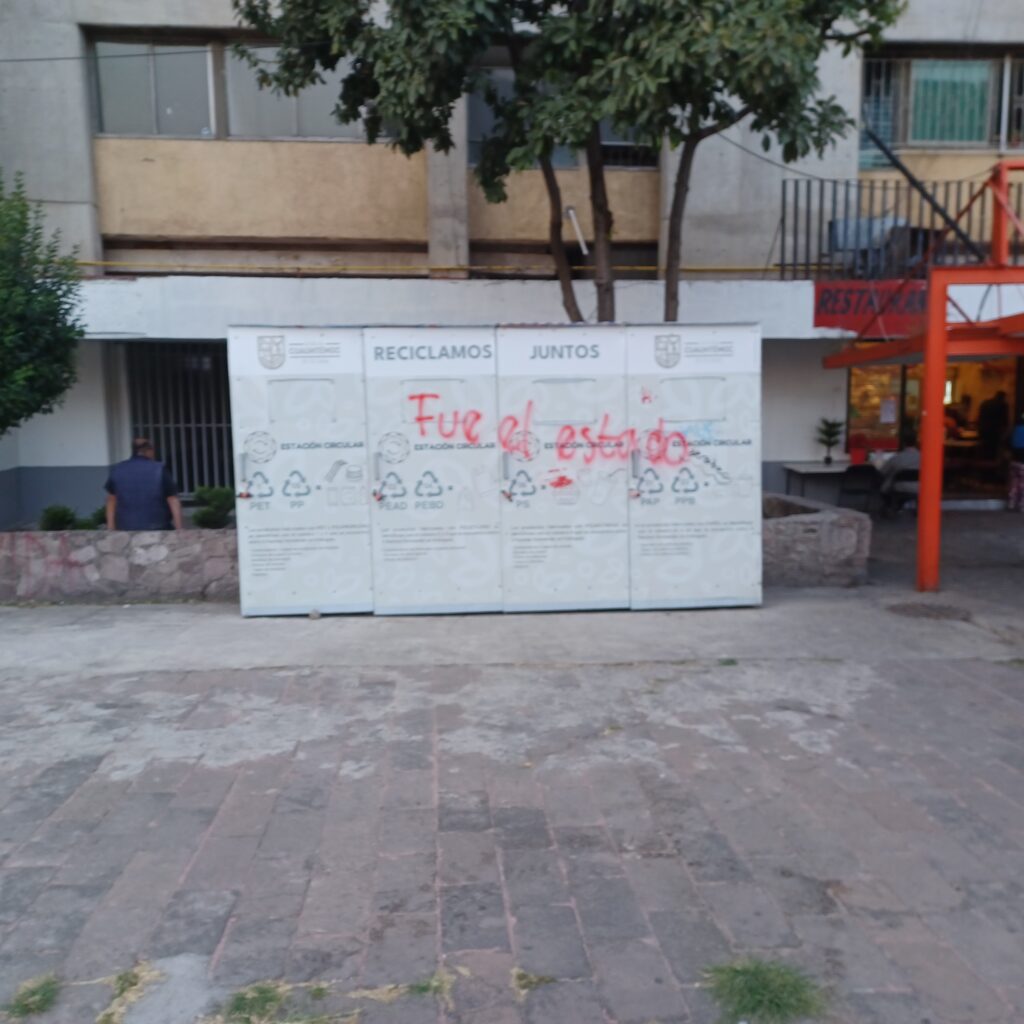
Leaving Tlatelolco, we saw graffiti asserting Fue el estado (it was the state). The graffiti blames the Mexican (narco-)state for the military’s Oct. 2, 1968 massacre in Tlatelolco. Provoked by presidential guard snipers, the regular Mexican military killed scores of unarmed civilians who were protesting the upcoming Olympics. More recently, the movement in Mexico to find the missing Ayotzinapa students has also used Fue el estado as a rallying cry. Those 43 students were disappeared in the Mexican state of Guerrero, disappeared while busing to the city of Iguala in part to raise funds to travel to this same place, Tlatelolco, for an anniversary march commemorating the Oct. 2 massacre. Imagine sitting in the plush corner office of some quarter-million-a-year psychiatrist in the States who can’t accomplish his own desired move away from Donald Trump, and telling him or her all that about Mexico. I’d much rather discuss it in CDMX with the Letras con Locura team. Note that the tragedies just mentioned weren’t unique to Mexico. With the backing of the United States, Operation Condor and military dictatorship ‘dirty wars’ plagued much of South America and beyond for a decade or more, roughly during the same time frame as the Oct. 2, 1968 massacre.
As I alternated between adrenaline and caffeine withdrawal, Iván, Santiago, and I finished the day at the Zócalo, the main, central square of Mexico City’s Centro. Before checking out the Aztec dancers, we watched the lowering of the huge Mexican flag in front of the El Palacio Nacional. Somewhere in that palace, Mexican’s first scientist president and first woman president, Claudia Sheinbaum, inaugurated in October, was assuredly discussing with aides how to respond to Trump’s tariff threats, or her new decree shielding the national textile industry (one of those La Jornada headlines), or some other world-historic matter. Iván expressed high hopes for Sheinbaum’s sexenio (the name for a Mexican president’s single six-year term). So did Luis, on Thursday, much more cautiously, but he expressed worries as well. Omar García Harfuch, he pointed out, Sheinbaum’s pick for Secretary of Security and Civilian Protection, is the son of Javier García Paniagua, who during the Mexican Dirty War headed the Federal Security Directorate, a secret-police spy agency known for killing and torturing students, political prisoners, activists. On Dec. 20, the George Washington University-based National Security Archive’s Mexico Project released a curation of declassified U.S. documents about the Dirty War in Mexico, presenting, the researchers say, a “clearer picture than has ever been available of the ‘systematic and widespread’ human rights abuses committed by Mexican intelligence, military, police, and parastate forces that targeted ‘broad sectors of the population’ between 1965 and 1990.”
What to make of Harfuch’s appointment is impossible for me to say, no expert in Mexican politics. Off the cuff, it reminds me of Kamala Harris chest-pounding like any GOP militarist on topics such as border control and crime. The days of presidents not totally given over to their countries’ national security powerbases are long gone, if they ever even existed. In that respect, Mexico and the United States once more seemed not so different after all. Yet Harfuch has been key to detaining organized crime leaders, as in Operación Enjambre, I’m told. Maybe it takes one to know one. Or maybe the apple doesn’t fall far from the tree and horrors by his hand are hitting Mexico already. Family isn’t destiny; sometimes black sheeps become the freest spirits. Other times, despite the ridiculousness of the lazy claims that genes control your every thought and emotion, even the biggest rebel can find himself suddenly aping nearly forgotten mannerisms of a grandparent—I occasionally scrunch my nose up in disgust in a way that imitates, I’ve only recently realized, my late paternal grandfather. Sometimes I even do it this far from Gilmer.
Protesta Economica Feminista
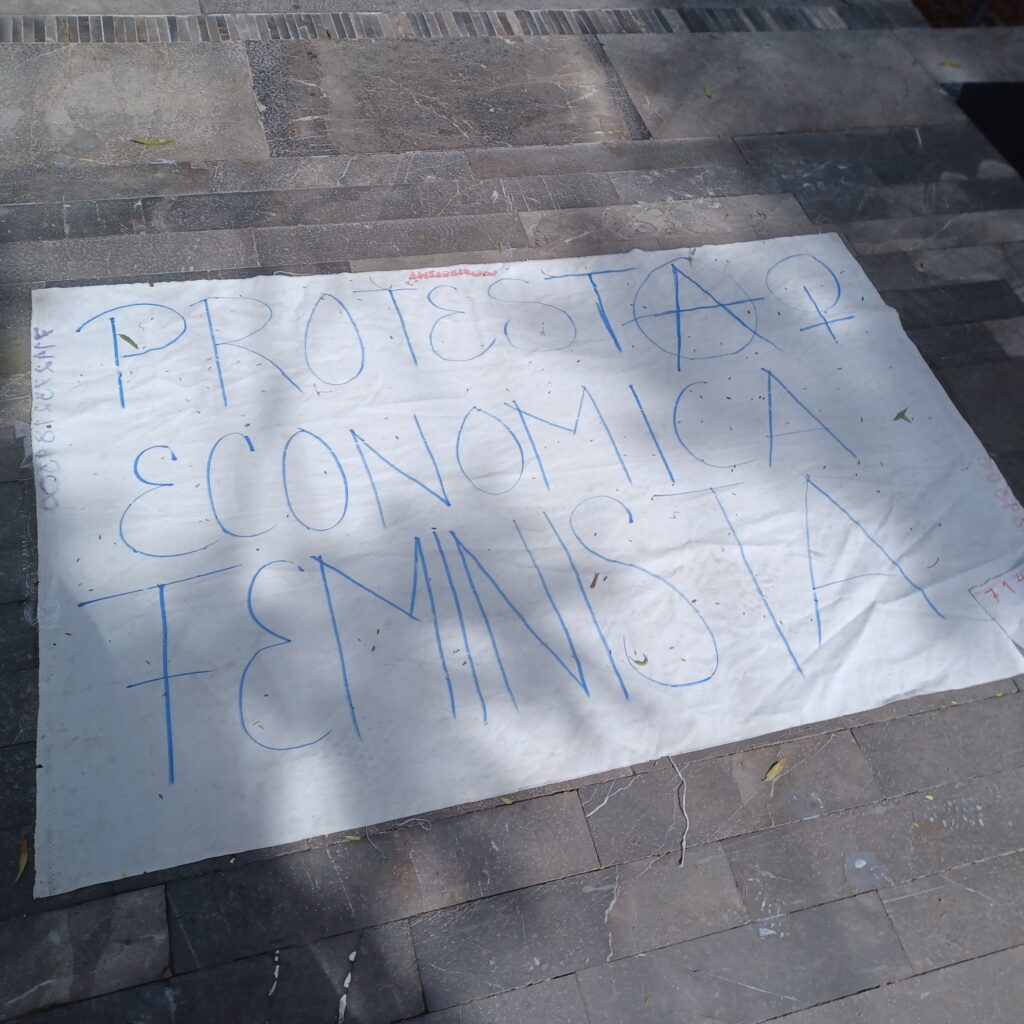
On Thursday, walking back to my hostel, I passed a street vendor selling her handmade jewelry—and proselytizing for anarchistic feminism with signs she’d penned and laid out on the sidewalk. Stunned, I stood still, looking down and slowly translating, in my head, the longest one: “Economic independence is fundamental for freedom of women—without it, economic violence becomes a tool of control that perpetuates gender inequality.”
Smiling, she asked me if I had any questions.

I told her I was a freelance writer and journalist from Seattle. I wish I’d thought to ask for her opinion on the women-only optional subway train. Instead, I told her about #OpJane (¡Ellxs arrojan embotellas de fuego!) and said my female friends back in the U.S. would get a kick out of her signs. At this she brightened extra, nodding, and saying yes, please do that as I snapped pictures of her agitprop.
Heading in the opposite direction as the United States, where the Supreme Court overturned Roe v. Wade in 2022, Mexico last year decriminalized abortion countrywide. The stronger and stronger Mexican women’s movement was hugely responsible for this landmark in the liberation of reproductive rights. As this article explains, they showed up for themselves and each other:
“The strategy we did in Mexico City was of a different order. … It was a legislative strategy,” said Marta Lamas, one of Mexico’s most prominent feminists. But “if you don’t have people on the street demanding and pushing, it is very difficult,” added Lamas, a political science professor at the National Autonomous University of Mexico who testified at the Supreme Court of Justice of the Nation in the groundbreaking trial that upheld legalized abortion in Mexico City.
I cheerfully waved goodbye to the street vendor. Days later, I sometimes find myself wondering what her next sign will say.

Mexico, that is to say, the weekend
Red metropolises in the United States—such as Dallas/Fort Worth—are like weekdays at a tyrannical workplace; a U.S. blue port—such as Seattle—is like a weekday at a benevolent dictatorship workplace at best. The ol’ good cop, bad cop one-two. Canada, or at least Victoria and Vancouver based on my 2019 experience, is an ever bluer version of Seattle, a weekday at something approaching an actual liberal democracy workplace, with single-payer universal health insurance and no mass shootings, but still the systemic requirement that you trade your services to the powerful or beg for charity or die, with the idea that another way of life—inclusive sharing—might have long existed completely nonexistent in the supposedly sane minds of most.
Wage-slavery is still a paramount thing in Mexico, of course. But Mexico feels like it’s the f-in weekend.
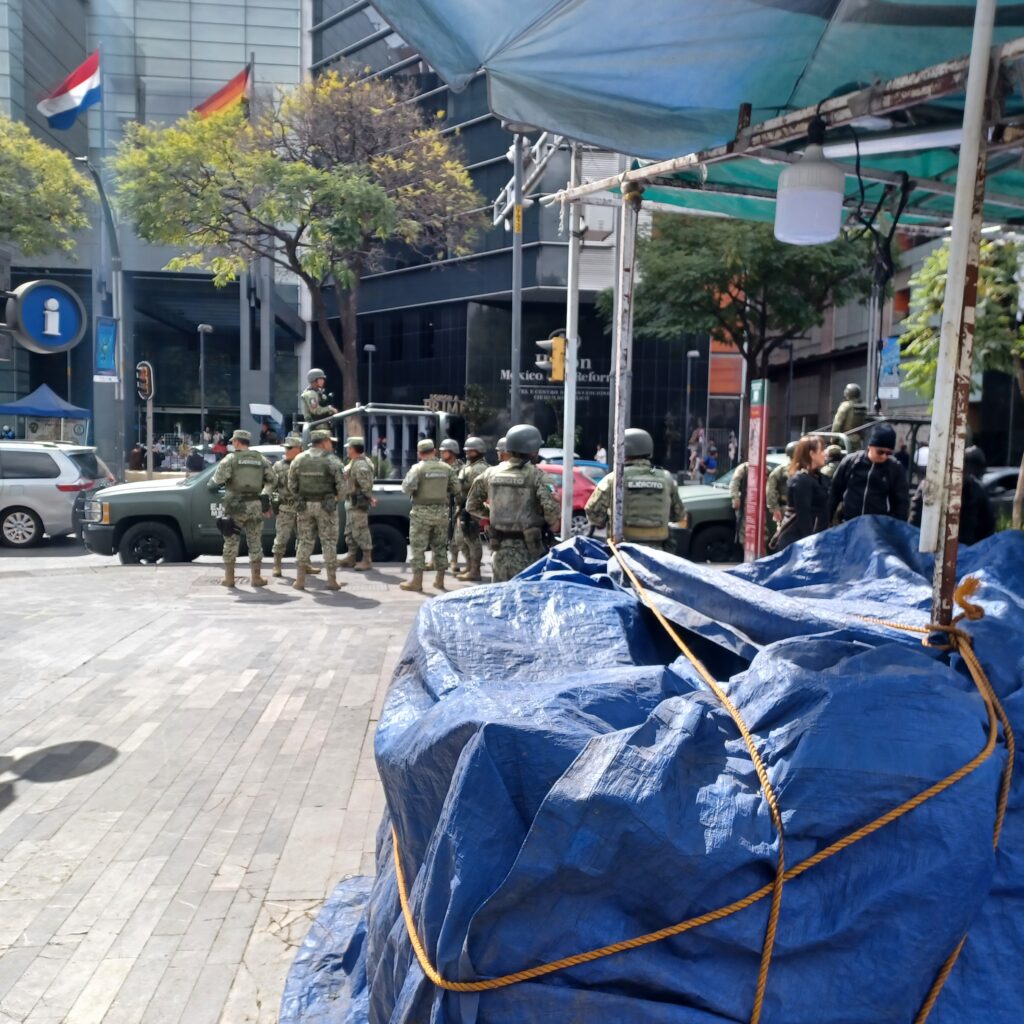
Even with the Mexican military on the streets—at the behest of former Mexican president Felipe Calderón in 2006, who assigned the armed forces the leading role in his “War on Drugs”—CDMX, or at least the Centro, is a calm, chill place. The laid back attitude is ubiquitous. I saw a cop directing traffic while simultaneously yawning and checking her phone. “Mexican time” is a thing. Take your Marty Friedman Dreaming Japanese book to the vegan restaurant; in the States, you’d be in and out of the joint in under an hour, having barely read two chapters—in the Centro, plan on 90 minutes or more, easy, if you’re engrossed in your book. Why would the waitstaff bring you la cuenta (the check) when they could do plenty of other things and let you read? It’s refreshing but also curious to feel time slide around strangely. What I see on my wristwatch doesn’t compute with what’s going on in my psyche, like some sort of light-speed traveller.
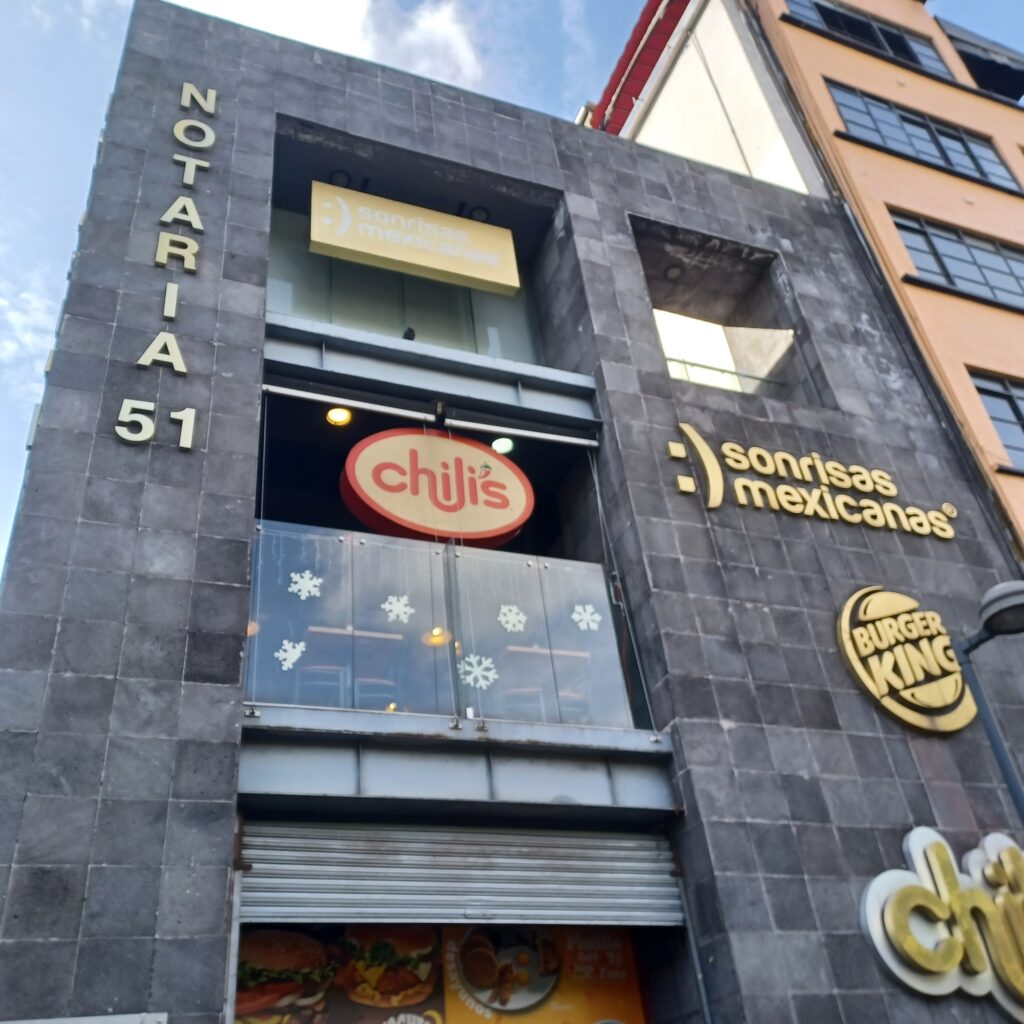
When I went to British Columbia in 2019, I noticed the lower ambient stress levels immediately once I got off the ferry from Seattle. What the—is everyone on Valium or something? And then I realized USians are really just that high-strung, and often unaware of the tense environment they’ve become calibrated to. CDMX is like Victoria but even more so. My body seems to be registering the relaxation. Sure, there are U.S. corporate restaurants like Chili’s and Burger King, but they’re few in number and easy to avoid. The healthy meals I’ve obtained, lacking any “organic” labels, come in smaller portion sizes than their United States equivalents, and taste more genuine than U.S. organic-labelled food, for far cheaper, yet I really think the lack of ambient stress is what’s apparently caused 5+ pounds to fall off me in the past week. That’s just from looking in the mirror and the fit of my slacks, so I could be wrong, but probably not. And people are asking why I went to Mexico?
When I was relinquishing my apartment, my appetite was bizarre. Eating is an exercise in selfish mini-hoarding: packing on the pounds. Meanwhile, shedding all of my worldly belongings seemed, energetically, the exact opposite. So my body felt really confusing (not to mention the caffeine and shortchanged sleep). Here, it seems the widespread sense of safety is permitting my body to toss overboard some of my unnecessary fatty shielding. And while I ran miles and intermittent-fasted and all that in the States when I didn’t have an overdue journalism article deadline dominating my life, in Mexico City I haven’t done anything exercise- or health-wise besides walk around with a crazy blue backpack and lug a ginormous swollen suitcase, which, okay, is a lot. But still, like, was the problem the fish, or the fishbowl?
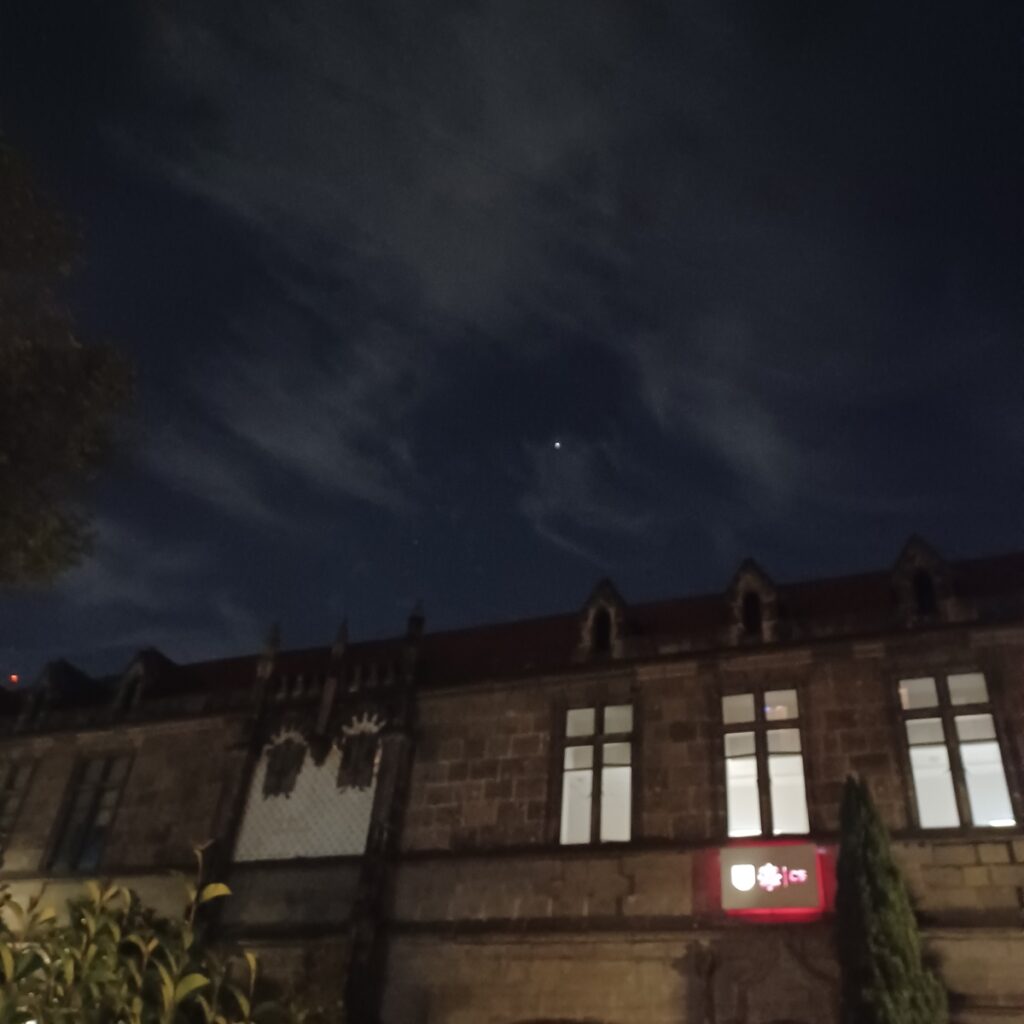
My friends are far away physically, but it hasn’t mattered much. I’m still messaging with ’em back in the States via SMS, Signal, social platforms, or email, although I’ll have to figure out eSIM(s) or whatever for my phone eventually (don’t get me started on that topic). I called a store in Seattle to follow up about something without even having to dial the country code. My Hearing Voices Network friend in Washington state prison has a Securus tablet permitting e-messaging—basically email—and I was able to attach some of the photos from this very blog post in correspondence with him. Our e-messaging goes swimmingly so long as the guard tearing out their hair reading my baroque sentences decides not to censor anything, which hasn’t happened yet, though that Nobel Prize for Literature panelist working at the prison is assuredly fed up with having to skim my writing.
I’ve noticed people older than I am tend to treat this kind of travel as some tremendous, irrevocable change, but younger people aren’t so thrown off by it. It’s becoming increasingly common to meet someone—as one of my friends in Fort Worth did—far away, the United Kingdom in her case, gaming online, and have a long-distance relationship. For her, it culminated in a month-long face-to-face meeting and even plans to migrate to his country. I mean shit, the notorious Seattle Freeze makes it hard to hang out with people in person in the Emerald City anyway. Is it really that big of a deal that I’m in Mexico for six months? And no, I haven’t decided what I’m going to do when my visa runs out in mid-June. Why borrow trouble? I’m on Mexican time. I’ll figure it out later.
On one of my last nights here in CDMX, crossing a wider intersection with more traffic and traffic lights than usual, I saw, in what’s akin to a bike lane, a young man and young woman rollerblading, moving in perfect sync with diagonally dancing legs as they held hands, sweaty fingers interwined, interlocked.
Last night I did have an awful nightmare. Sleeping in my tiny hostel room, I came to perceive that I was actually trapped in some sort of dumpster, and a garbage truck was about to destroy me forever. I started screaming my head off, so much so that an employee was called to check on me in the middle of the night. He (or she?) opened the door slightly, letting in light through the crack, as I, nude on the floor, tucked into a ball, looked up and mumbled, only English available to me, Nightmare, sorry, nightmare, sorry. “You sure? You sure?” they asked. Yes, nightmare, sorry. I’ve had night terrors off and on my whole life; I’m not sure what caused this one. Maybe loneliness or the fear thereof. Or maybe this whole adventure (and this headbanger’s diplomatic cable of a blog post) has required adopting some bravado, some acting like all this is easy-peasy, when really it is kinda huge.
I don’t particularly have time to think about it. Everything is so focused on practicalities presently. In not that many hours from now, I’m getting on another Aeroméxico flight headed for the Mexican state of Chiapas, where prices will be even cheaper, where I’ll meet up with a friend, where I’ll find an apartment. I wish I had some grand message to give you at the end of this mammoth post, but I don’t. This week has really worn me out, not in a bad way, nightmare aside; rather, happily, like going to a carnival or festival and then, tired, coming back—home.
Which is. Where?
You can answer that with your own cliché. I’ve got a ballooning suitcase to miraculously zip up, and a Spanish-everything plane to catch.


This blog post, Memo from Mexico City, by Douglas Lucas, is licensed under a Creative Commons Attribution-NonCommercial-ShareAlike 4.0 International License (summary). The license is based on the work at this URL: https://douglaslucas.com/blog/2024/12/21/title-goes-here/. You can find the full license (the legalese) here. To learn more about Creative Commons, I suggest this article and the Creative Commons Frequently Asked Questions. Please feel free to discuss this post in the comments section below, but if you’re seeking permissions beyond the scope of the license, or want to correspond with me about this post (or related topics) one on one, email me: dal@riseup.net. And gimme all your money!
 Twitter:
Twitter:
0 comments ↓
There are no comments yet...Kick things off by filling out the form below.
Leave a Comment